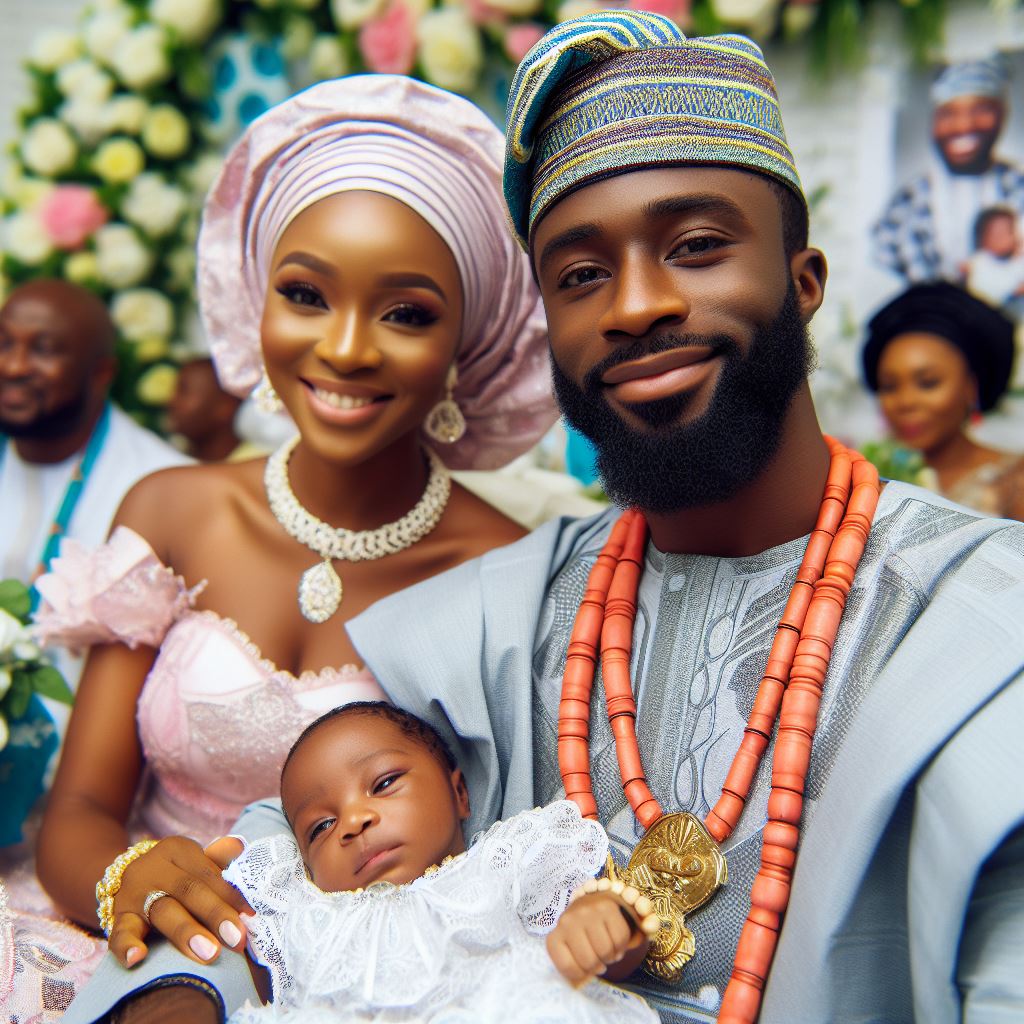Nigerian Baby Names: Tribes & Significance
Last Updated on December 27, 2023
Introduction
In this blog post, we will explore Nigerian Baby Names Tribes and Significance
Baby names hold a significant role in Nigerian culture, reflecting the importance of identity and heritage.
Each name carries a deep meaning and represents a connection to the rich tribal communities that exist in the country.
Brief explanation of the importance of baby names in Nigerian culture
In Nigerian culture, baby names are seen as more than just a label. They are chosen carefully, as they have the power to shape a child’s destiny and character.
These names often reflect the aspirations, beliefs, and values of their families and communities.
Overview of the diverse tribal communities in Nigeria
Nigeria is home to a diverse range of tribal communities, each with its own distinct traditions, languages, and naming conventions.
From the Yorubas in the west to the Igbos in the east and the Hausas in the north, every tribe has its unique naming customs.
The Yorubas, for example, have a naming ceremony called “ìsinmi.” They believe that a child’s name is closely tied to their destiny and will influence their journey in life.
The Igbos, on the other hand, often incorporate the circumstances of a child’s birth or attributes into their names.
The Hausas, known for their Islamic influence, commonly use Arabic names combined with native Hausa names. This reflects their historical ties to Islam and their tribal identity.
These diverse naming customs highlight the cultural richness and diversity of Nigeria.
Baby names in Nigeria are not just a simple designation but a way to honor the past, embrace the present, and shape the future.
Yoruba Names
Yoruba tribe and its significance in Nigerian culture
The Yoruba tribe is one of the largest ethnic groups in Nigeria, known for its rich cultural heritage.
Yoruba people are primarily found in the southwestern part of the country.
They have a deep sense of pride in their traditions and customs, which are reflected in their choice of names for their children.
Yoruba names often have significant meanings attached to them, reflecting the values, beliefs, and aspirations of the parents.
These names can be categorized into different themes, including blessings, beauty, love, strength, or even religious affiliations.
They take great care in choosing a name that will embody the character or destiny they envision for their child.
Common Yoruba baby names and their meanings
Some common Yoruba baby names and their meanings include:
- Ade: This name means “crown” or “royalty.” It is often given to children believed to have the potential to be great leaders.
- Ayodele: Meaning “joy has come home,” this name is often given to a child born after a period of sadness or loss in the family.
- Babatunde: A name that means “father has returned,” it is often given to a child born after the father had been absent for a while.
- Funke: This name is derived from the Yoruba word “afunke,” which means “someone to pamper.” It is often given to a child believed to bring joy and comfort to the family.
- Olumide: Meaning “God has come,” this name is given to a child believed to have a special connection with the divine.
- Taiwo: This name is often given to the firstborn of twins and it means “taste the world.” It signifies the child’s position as a trailblazer and the beginning of a new phase in the family.
Popular Yoruba names and their cultural significance
Some popular Yoruba names and their cultural significance include:
- Olaitan: This name means “wealth is worth more than gold.” It reflects the importance of material wealth and success in Yoruba culture.
- Ifeoluwa: Meaning “love of God,” this name signifies a deep spiritual connection and devotion to worship.
- Ayomide: This name means “my joy has come.” It reflects the belief in the Yoruba culture that a child brings immense happiness and fulfillment to the family.
- Oluwatosin: Meaning “God is worthy to be served,” this name is a testament to the religious beliefs and practices of the Yoruba people.
- Adebayo: This name means “the crown meets joy.” It reflects the expectation that the child will bring prosperity and happiness to the family.
In fact, Yoruba names have deep cultural significance in Nigerian society.
They not only reflect the aspirations and beliefs of the parents but also serve as a means of passing down the rich heritage of the Yoruba tribe.
These names hold great value and are a source of pride for the Yoruba people, reinforcing their strong sense of identity and connection to their roots.
Read: Choosing a Baby Name: Culture & Modernity
Igbo Names
Igbo tribe and its significance in Nigerian culture
The Igbo tribe is one of the largest ethnic groups in Nigeria, known for their rich cultural heritage.
Igbo names often have deep meanings, reflecting the beliefs, values, and aspirations of the community.
Common Igbo baby names and their meanings
Here are some common Igbo baby names and their meanings:
- Chidimma – “God is good” – signifies gratitude and faith in God’s goodness.
- Obinna – “Father’s heart” – symbolizes a child’s importance and love within the family.
- Ngozi – “Blessing” – represents the hope and joy a child brings to their parents.
- Ifeoma – “Something good” – expresses the belief in a child’s positive destiny.
- Chukwudi – “God’s will” – reflects the importance of following God’s plan.
Popular Igbo names and their cultural significance
Igbo names often have cultural significance and reflect the tribe’s history and traditions.
For example, Nwakaego, which means “beautiful child,” emphasizes the importance of beauty in Igbo culture.
Another popular name is Chiemeka, which means “God has done well.” It reflects the Igbo people’s belief in a higher power and gratitude for their blessings.
Igbo names can also reflect the day a child is born. If a child is born on Eke, which is one of the four market days, they may be named Ike, meaning “strength.”
Similarly, Nkwachi, meaning “born on a Friday,” acknowledges the importance of the day of the week in Igbo culture.
In addition to these names, there are also Igbo names based on personal characteristics or achievements.
For instance, Nkechi, which means “what I have is great,” signifies the Igbo people’s pride in their possessions and accomplishments.
Igbo names can also be gender-specific. Ada, meaning “first-born daughter,” showcases the significance of the eldest daughter in the family.
On the other hand, Nwafor, meaning “child of peace,” represents the desire for harmony and tranquility in a male child.
Overall, Igbo names are not just labels but carry cultural weight and reflect the aspirations, beliefs, and values of the tribe.
Whether it’s expressing gratitude to God, acknowledging beauty, or emphasizing personal characteristics, Igbo names serve as a reminder of the tribe’s rich history and culture.
Read: Nigerian Names from Mythology & Their Meanings
Hausa/Fulani Names
Hausa/Fulani tribe and its significance in Nigerian culture
The Hausa/Fulani tribe is one of the major ethnic groups in Nigeria, known for their rich cultural heritage.
In Nigerian culture, people choose Hausa/Fulani names based on their meanings, which hold significant importance.
Let’s explore some common Hausa/Fulani baby names and their cultural significance.
Common Hausa/Fulani baby names and their meanings
- Aisha: This popular Hausa/Fulani name means “alive” or “she who lives.” It is associated with blessings and longevity.
- Ibrahim: A name derived from the Arabic language, Ibrahim means “father of many nations.” It is a symbol of leadership and strength.
- Fatima: This name holds cultural significance as it was the name of Prophet Muhammad’s daughter. Fatima means “the shining one” and represents purity and beauty.
- Aliyu: A commonly used Hausa/Fulani name, Aliyu means “noble” or “exalted.” It signifies honor and importance within the community.
- Zainab: A name of Arabic origin, Zainab means “fragrant flower.” It symbolizes beauty and grace.
- Abdul: The prefix “Abdul” is often used in Hausa/Fulani names, derived from the Arabic word meaning “servant” or “slave of.” For example, Abdulrahman means “servant of the merciful.”
- Safiya: Meaning “pure” or “innocent,” Safiya represents righteousness and moral integrity.
- Yusuf: Derived from the Arabic name Yūsuf, Yusuf means “God increases” or “he will increase.” It is associated with blessings and prosperity.
- Amina: A popular Hausa/Fulani name, Amina means “trustworthy” or “honest.” It represents reliability and loyalty.
- Umar: This name signifies longevity and strength. Umar means “prospering” or “thriving.”
- Halima: Halima is a common Hausa/Fulani female name, meaning “gentle” or “patient.” It symbolizes kindness and compassion.
- Musa: Derived from the Arabic name Moosa, Musa means “drawn out of water.” It holds religious significance as it was the name of Prophet Moses.
Popular Hausa/Fulani names and their cultural significance
The Hausa/Fulani tribe, primarily found in Northern Nigeria, has a deep-rooted influence on Nigerian culture. Their names reflect their ethnic identity, values, and beliefs.
These names are not merely random choices but carry significant meanings that connect individuals to their cultural heritage.
By giving their children Hausa/Fulani names, parents uphold their cultural traditions and pass down their ancestral identity.
These names act as a reminder of their roots and a reflection of their cultural pride.
Additionally, Hausa/Fulani names play a role in fostering a sense of community and belonging.
They create a bond among individuals who share the same cultural background and help preserve the traditions and customs of the tribe.
In short, Hausa/Fulani names are an integral part of Nigerian culture, representing the rich heritage and traditions of the tribe.
Each name holds deep cultural significance and symbolizes qualities like honor, beauty, and strength.
By embracing these names, individuals not only honor their ancestors but also strengthen their ties to their cultural roots.
Read: Rare and Beautiful Nigerian Baby Names

Other Nigerian Tribes and Names
Nigeria is a country rich in cultural diversity, with over 250 different ethnic groups.
These tribes each have their unique languages, traditions, and, of course, baby names.
In this section, we will explore some of the other Nigerian tribes and their cultural significance through the lens of the names they give their babies.
Yoruba Tribe
The Yoruba tribe is one of the largest ethnic groups in Nigeria, mainly concentrated in the southwestern region of the country.
They are known for their rich cultural heritage and unique names. Some popular Yoruba baby names include:
- Adewale (meaning “crown has arrived”) – This name signifies the arrival of a prestigious child.
- Ayomide (meaning “my joy has come”) – A name given to celebrate the arrival of a beloved child.
- Olamide (meaning “my wealth has come”) – This name symbolizes the happiness and prosperity a child brings.
Hausa Tribe
The Hausa tribe predominantly inhabits northern Nigeria, embracing a strong Islamic influence and cherishing their customs.
Some commonly used baby names from the Hausa tribe are:
- Aisha (meaning “lively”) – A name commonly given to signify a lively and energetic girl.
- Mohammed (meaning “praiseworthy”) – This name honors the Prophet Mohammed and his teachings.
- Fatima (meaning “captivating”) – A name often given to signify a beautiful and captivating girl.
Igbo Tribe
The Igbo tribe is one of the largest ethnic groups in Nigeria, primarily located in the southeastern region of the country.
The Igbo people are known for their rich cultural heritage and distinct names. Some popular Igbo baby names include:
- Chukwuemeka (meaning “God has done something great”) – A name given to appreciate divine blessings.
- Nneka (meaning “mother is supreme”) – This name acknowledges the importance of mothers in Igbo society.
- Chinyere (meaning “God gave”) – A name often given to signify a child as a gift from God.
Ibibio Tribe
The Ibibio tribe is located in the coastal region of Nigeria, primarily in Akwa Ibom State.
They have a unique naming tradition that reflects their spirituality and cultural beliefs. Some commonly used baby names from the Ibibio tribe are:
- Udofia (meaning “peaceful heart”) – A name given to signify a child with a calm and peaceful nature.
- Uduak (meaning “will of God”) – This name reflects the belief that everything is predetermined by God.
- Ekemini (meaning “thanks”) – A name given to express gratitude for the blessing of a child.
Tiv Tribe
The Tiv tribe, also known as the “Munchi” people, can be found in central Nigeria, mainly in Benue State.
They have a unique naming system that reflects their agricultural way of life. Some popular Tiv baby names include:
- Tor (meaning “king”) – This name signifies strength and leadership qualities.
- Aondoaver (meaning “God’s grace”) – A name given to appreciate divine favor and blessings.
- Mbatsagher (meaning “unity”) – This name symbolizes the importance of togetherness and harmony in their society.
Various Nigerian tribes beautifully represent cultural diversity through their baby names, showcasing the nation’s rich cultural tapestry.
Each tribe has its unique traditions and beliefs, which are reflected in the names they choose.
These names not only hold cultural significance but also serve as a way to celebrate the arrival of a child and honor their heritage.
Read: Muslim Names for Babies in Nigeria: A Guide
Factors Influencing Baby Name Choices in Nigeria
When it comes to naming their babies, Nigerians are influenced by a variety of factors.
These factors play a significant role in the choice of names and reflect the cultural diversity and traditions of the country.
Let’s explore some of the key influencers in Nigerian baby naming practices.
Influence of Religion on Baby Names
Religion holds immense importance in Nigeria, and it greatly influences the choice of names for newborns.
Nigerian parents often select names with religious significance to reflect their faith and beliefs.
For example, Muslim families may choose names with Arabic origins, such as Abdul, Fatima, or Aisha, while Christian families may opt for biblical names like David, Grace, or Samuel.
Influence of Family and Traditions on Naming Practices
Family plays a pivotal role in Nigerian culture, and this extends to the naming of babies.
Many Nigerians adhere to the practice of naming their children after family members, both living and deceased, to honor and preserve familial ties.
This practice strengthens the bond between generations and creates a sense of continuity within the family lineage.
Additionally, Nigerian tribes have unique naming traditions.
For example, the Yoruba people often give their children names that reflect their circumstances or birth order.
Names like Ade (crown), Sola (wealth), or Yetunde (mother has returned) are commonly used.
Similarly, the Igbo tribe frequently gives their children names with deep meanings, such as Chukwu (God), Nneka (Mother is supreme), or Obinna (Father’s heart).
Modern Trends and the Impact of Western Cultures on Baby Naming in Nigeria
As globalization continues to influence societies worldwide, Nigeria has not been immune to the impact of Western cultures on baby naming practices.
Nigerian parents are increasingly adopting more contemporary and Westernized names for their children.
Names such as David, Michelle, Emily, or Benjamin are becoming more popular, especially in urban areas.
Various factors, like exposure to Western media and international travel, drive the shift towards modern trends, craving uniqueness.
Nigerian parents now have access to a wider range of names and are more open to exploring different cultural influences when selecting names for their children.
It is important to note that while modern trends are gaining popularity, traditional Nigerian names still hold great significance.
Many parents strive to strike a balance between embracing new trends and preserving their cultural heritage, leading to a diverse mix of names in Nigerian society.
In review, the factors influencing baby name choices in Nigeria are complex and multifaceted.
Religion, family traditions, and the impact of Western cultures all play a significant role in shaping naming practices.
Nigerian parents, influenced by changing trends, maintain deep respect for their cultural heritage and traditions.
This blending of old and new creates a rich tapestry of baby names in Nigeria, reflecting the country’s vibrant diversity.
Conclusion
Nigerian baby names hold great cultural significance and should not be overlooked.
The names reflect the rich diversity of Nigerian tribes and carry a sense of identity and heritage.
It is important for parents to explore these tribes and their meanings when choosing a name for their child.
By doing so, they can honor their heritage and pass down a legacy to future generations.
So, let’s embrace the beauty and significance of Nigerian baby names and celebrate the diversity that our tribes offer.


